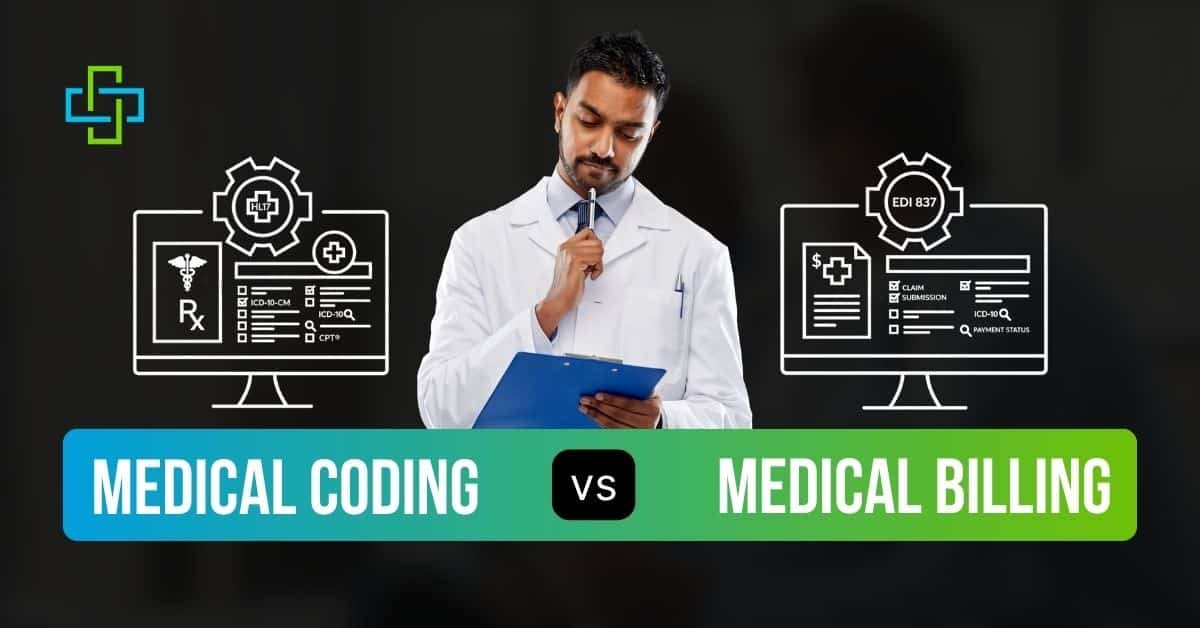Medical billing & medical coding are the same thing. They’re not. These are two different jobs that handle different parts of the payment process in healthcare.
If you’re thinking about working in healthcare or just trying to understand what these roles do, here’s a simple breakdown of medical billing vs medical coding.
What Is Medical Coding?
Medical coding is taking what happened during a patient visit and turning it into codes. These codes are basically a universal language that insurance companies and healthcare systems use to understand what services were provided.
When a doctor treats a patient, someone needs to translate that visit into specific codes. Did the patient get a chest X-ray? There’s a code for that. Did they get diagnosed with diabetes?
There’s a code for that too.
Medical coders use three main coding systems:
- ICD-10 – This is for diagnoses. If someone has type 2 diabetes, the code is E11.9. Every condition has its own code.
- CPT – This covers procedures and services. A chest X-ray might be code 71045. It tells insurance what was actually done.
- HCPCS – This is for supplies, equipment, and some services that CPT doesn’t cover. Things like injections or medical devices.
Coders need to know medical terms, anatomy, and how these coding systems work. They also need to understand privacy rules and billing regulations. The codes they pick affect whether claims get paid or denied, so accuracy matters.
What Is Medical Billing?
Medical billing happens after coding. Billers take those codes and use them to create claims that get sent to insurance companies or patients.
Their job is to make sure healthcare providers get paid. That means submitting claims, following up when payments are late, and fixing problems when claims get denied.
Medical billers deal with insurance companies a lot. They handle appeals when claims are rejected, set up payment plans with patients, and verify that someone’s insurance will actually cover the visit before it happens.
The billing process depends on getting the right codes from medical coders. If the codes are wrong, the claim gets denied and the biller has to fix it.
Medical Billing vs Medical Coding: The Main Differences
Here’s how to think about it: coders translate medical information into codes, and billers use those codes to get providers paid.
- Medical coders work with patient records and medical documentation. They focus on accuracy and knowing which codes to use. They usually work independently and don’t interact much with patients or insurance companies.
- Medical billers work with insurance companies and patients. They handle claims, payments, and disputes. They need good communication skills because they’re constantly dealing with people and solving problems.
Both jobs are necessary. You can’t bill without codes, and codes don’t matter if nobody submits the claims.
Which Job Fits Your Personality?
The medical billing vs medical coding question often comes down to what kind of work you prefer.
- If you like working with people, medical billing might be better. Billers talk to patients about bills, call insurance companies to check on claims, and work through payment issues. You need patience and good communication skills.
- If you prefer working alone, medical coding might fit better. Coders spend most of their time reviewing charts and assigning codes. It’s detailed work that requires focus. You’re not on the phone all day dealing with people.
Some people like both and end up doing a mix of coding and billing, especially in smaller practices.
Is a Career in Billing and Coding Difficult?
Is billing and coding hard? Both jobs have a learning curve. Medical coding requires learning medical terminology and memorizing a lot of codes and rules. You need to be detail-oriented because one wrong code can mess up a claim.
Medical billing requires understanding insurance policies, payer rules, and how to navigate claim denials. You need to know when to appeal, what documentation to include, and how to talk to insurance companies.
Neither job is impossible to learn, but they take training. Most people can pick up the basics in under a year with the right program.
Training and Certification
You don’t legally need certification to work as a medical biller or coder, but it helps. Certified billers and coders get hired faster and often make more money.
For medical billing, common certifications include:
Training usually takes around 7 months and covers claims processing, denial management, and insurance policies.
For medical coding, common certifications include:
Training takes about 8 months and covers diagnostic coding, procedural coding, and medical terminology. Most programs require some healthcare experience before you start.
Both types of training prepare you to take certification exams. Once you pass, you’re certified and can start applying for jobs.
How Billing Services Use Both Roles?
If you’ve ever wondered how medical billing companies in USA handle claims, they use both coders and billers.
At Prime Well Med Solutions, the process works like this: medical coders review patient charts and assign the correct codes. Then billers take those codes and submit claims to insurance companies. If a claim gets denied, billers work with coders to figure out if it was a coding error or an insurance issue.
Having both roles work together cuts down on errors and speeds up payments. A lot of practices outsource their billing and coding because it’s hard to hire and train good people for both jobs.
Medical billing services that combine coding and billing under one roof tend to get better results. The coders and billers can communicate directly, fix problems faster, and keep claims moving.
Why Practices Outsource Billing and Coding?
Managing billing and coding in-house is expensive. You need to hire staff, train them, keep up with coding changes, and deal with turnover when people quit.
Medical billing company makes sense for a lot of practices. Companies have trained coders and billers who already know the rules. They stay up to date on coding changes, handle denials, and have systems in place to track claims.
Practices that outsource usually see fewer claim denials and faster payments. They also save money on salaries, benefits, and office space for billing staff.
Which Career Path Should You Choose?
If you’re deciding between medical billing vs medical coding, think about what kind of work environment you want.
Pick medical coding if you:
- Like working independently
- Are good with details
- Don’t want to be on the phone all day
- Enjoy learning medical terminology
Pick medical billing if you:
- Like talking to people
- Are good at solving problems
- Don’t mind dealing with insurance companies
- Want a job with more variety in daily tasks
Both careers are in demand. Healthcare needs coders and billers, and that’s not changing anytime soon. You can also start in one role and move to the other later if you want to try something different.
Final Thoughts
Medical billing vs medical coding comes down to this: coders turn medical visits into codes, and billers use those codes to get providers paid. Both jobs are necessary, and both require training.
If you’re a practice looking for help with medical billing solutions, working with a company that handles both coding and billing usually gives better results. Our MIPS reporting company combines both roles to help practices get paid faster and deal with fewer claim denials.
Whether you’re looking to start a career in healthcare or just trying to understand how billing works, knowing the difference between these two jobs helps. They work together to keep the whole healthcare payment system running.
May You Need to Read:
The Best Medical Billing Companies You’ll Come Across In USA
Medical Billing vs Revenue Cycle Management: What’s the Real Difference
5 Best Practices to Streamline Your Medical Billing Program Workflow





